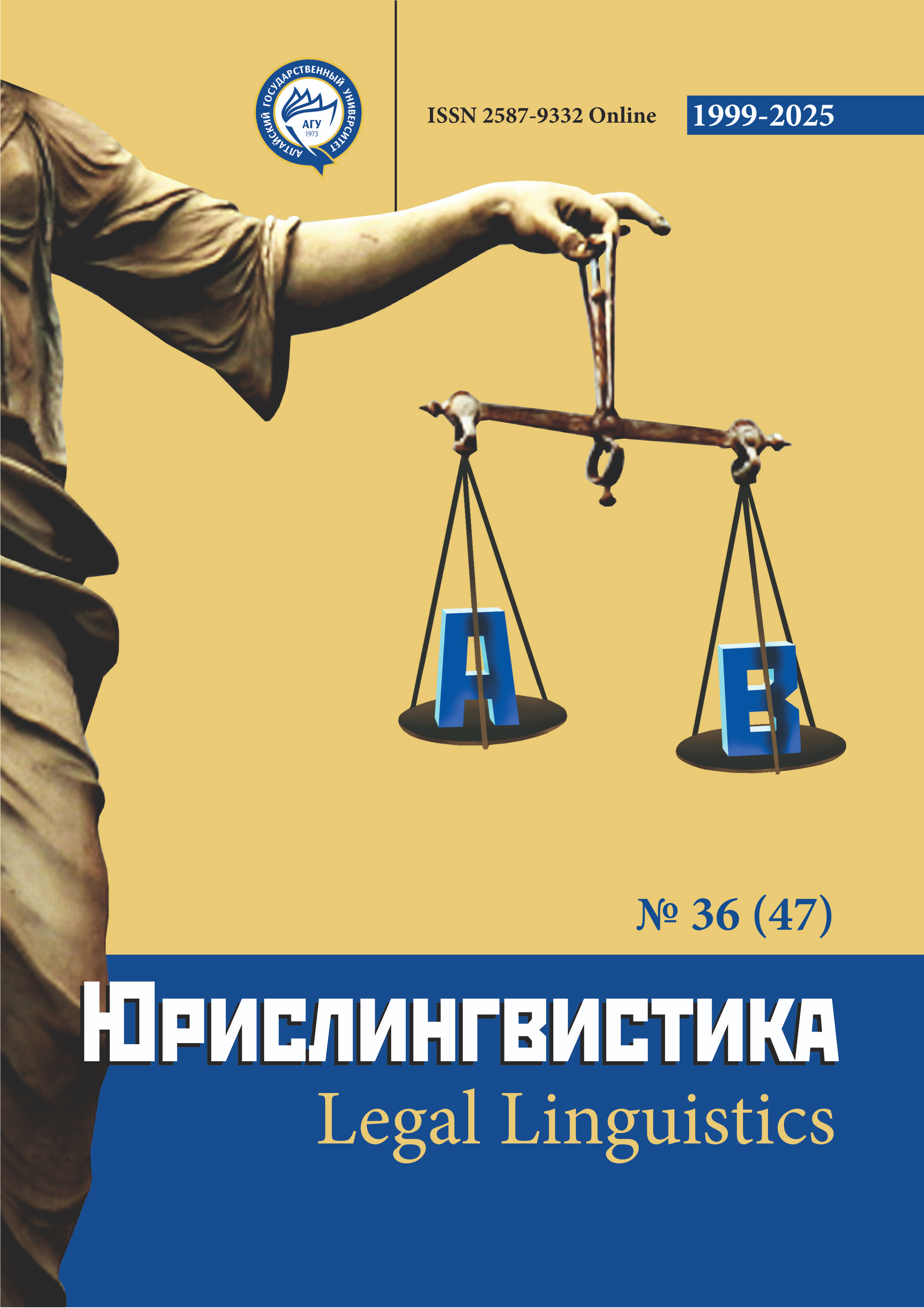Comprehension of Civil Law Contracts by Readers
УДК 81’272, ББК 81.25
Abstract
The article is concerned with the comprehension of modern legal texts by native Russian speakers. Legal texts play a huge role in the modern world and are an integral part of the law and language culture of society. The relevance of the study is due to the increasing complexity of legal relations in modern society and the need for an accessible statement of legal norms for general readers. The subject of the study is the comprehension of the texts of civil contracts, such as a purchase-sale contract and a credit contract. The article presents an analysis of a survey of 60 informants, the purpose of which was to identify the level of their comprehension of the presented legal texts. The questionnaire included 8 questions for each text with four answer options. As a result, 960 reactions were obtained and analyzed. The study showed that, despite the presence of a significant number of correct answers (from 55% to 93.3% depending on the question), there is a significant proportion of informants who have difficulty comprehending the texts of civil contracts. The most difficult questions for informants were those related to the rights and obligations of the parties to the contract, especially those that do not seem obvious based on common beliefs. The easiest questions in both cases were questions about the time when the action with the main subject of the contract occurs. The study shows that the difficulty in perceiving legal documents is associated with the peculiarities of legal language and legal writing, as well as insufficient legal literacy of the population.
Downloads
References
Анохина С. З., Вахитова Г. В. Лингвистические характеристики юридического текста как фактор влияния на его восприятие и понимание адресатом-юристом / Вестник Башкирского университета. – 2019. – № 2. – С. 425-429.
Белов С. А., Гулида В. Б. Язык юридических документов: сложности понимания / Acta Linguistica Petropolitana. Труды института лингвистических исследований. –2019. – № 15. – С. 56-103
Блинова О. В., Тарасов Н. А. Языковая сложность русских юридических подстилей и жанров / Научный результат. Вопросы теоретической и прикладной лингвистики. – 2023. – № 2. – Том. 9 – C. 73-96.
Вахитова Г. В. Исследование особенностей восприятия юридического текста / Филологические науки. Вопросы теории и практики. – 2016. – № 9-2 (63). – С. 68-71.
Галяшина Е. И. Лингвистическая экспертиза нормативных правовых актов как средство профилактики коррупции / Вестник экономической безопасности. – 2020. –№ 2. – С. 147-151.
Глазанова Е. В. Студентка vs водитель в возрасте, или почему никто не любит читать официальные документы / Социо- и психолингвистические исследования. – 2021. – № 9. – С. 76-85.
Голев Н. Д. Юридическая терминология в контексте доктринального толкования / Сибирский филологический журнал. – 2015. – № 4. – С. 138-148.
Коркунов Н. М. Лекции по общей теории права. М., 2010.
Пешкова Н. П., Вахитова Г. В., Ибатуллина Н. С. Восприятие и интерпретация текстов юридического дискурса (на материале поправок к Конституции Российской Федерации и интернет-комментариев) / Вопросы современной лингвистики. – 2020. – № 5. – С. 112-129.
Руднева Е. А., Трощенкова Е. В. Проблема понятности юридических документов в контексте профессиональной идентичности / Вестник Томского государственного университета. – 2023. – № 489. – С. 25-35.
Уздимаева Н. И. Проблемы классификации юридических документов / Контентус. – 2020. – № 7. – С. 42-50.
Шепелев А. Н. Критика теории простого юридического языка / ПРАВО: история и современность. – 2023. – № 4. – С. 408-414.
Martinez E., Mollica F., Gibson E. Poor writing, not specialized concepts, drives processing difficulty in legal language / Cognition. – 2022. – No. 224. URL: https://doi.org/10.1016/j.cognition.2022.105070
Martinez E., Mollica F., Gibson E. Even lawyers do not like legalese / Psychological and Cognitive Sciences. – 2023. – Vol. 120. – No. 23. URL: https://doi.org/10.1073/pnas.2302672120.
Copyright (c) 2025 Людмила Цыгульская

This work is licensed under a Creative Commons Attribution 4.0 International License.
The authors, which are published in this journal, agree to the following conditions:
1. Authors retain the copyright to the work and transfer to the journal the right of the first publication along with the work, at the same time licensing it under the terms of the Creative Commons Attribution License, which allows others to distribute this work with the obligatory indication of the authorship of this work and a link to the original publication in this journal .
2. The authors retain the right to enter into separate, additional contractual agreements for the non-exclusive distribution of the version of the work published by this journal (for example, to place it in the university depository or to publish it in a book), with reference to the original publication in this journal.
3. Authors are allowed to post their work on the Internet (for example, in a university repository or on their personal website) before and during the review process of this journal, as this may lead to a productive discussion, as well as more links to this published work (See The Effect of Open Access).










